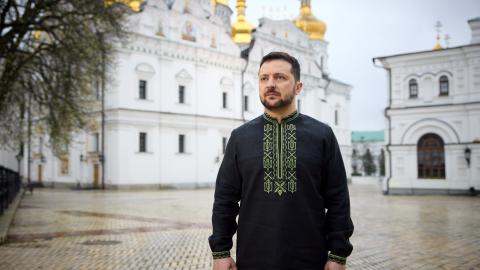The night after Volodomyr Zelensky returned from his recent swing across western Europe, and before he departed on his current mission to the Arab League Summit in Jeddah and the G7 in Hiroshima, Russia launched one of its most audacious and complex airstrikes since the beginning of the war. This time, however, Ukraine was prepared as never before.
Two US Patriot air defense systems had been made operational in Ukraine just a few weeks before. So far, the effectiveness of the Patriot has been beyond expectations. On the night of the airstrikes, Russia fired 18 missiles and nine drones. All were intercepted by air defense systems provided by the West. The Patriot system shot down six Kinzhal hypersonic missiles traveling at 10 times the speed of sound. Before the war, Russian officials believed the Kinzhal was unstoppable. American experts thought the Patriot could shoot it down “in theory.” Ukraine has now turned that theory into a reality.
The effectiveness of Western air defense systems at protecting Ukrainian civilians from Russian missiles has been impressive. It is also a reminder of how important it is for Zelensky to make the case for continued military support, which is what he is doing on his current travels.
In Rome, he was warmly greeted by Italy’s new Prime Minister Giorgia Meloni, who has been a staunch supporter of Ukraine since she was elected last October. When she entered office there was a concern that Italy might change its approach to Ukraine. Thankfully these concerns have been unfounded. On the contrary, Meloni has become one of the most vocal supporters of Ukraine’s defense. Italy, working with France, has recently sent an advanced SAMP/T air defense system to Ukraine. To date, Italy has provided just over $1 billion in military assistance to Ukraine.
Zelensky also had fruitful visits to Paris and London, where he received new pledges of further military support. This included a British-led initiative to train Ukrainian pilots on Western fighter jets and a commitment by France to provide air-launched cruise missiles. But perhaps the greatest achievement of Zelensky’s tour came in Berlin. Chancellor Olaf Scholz promised a new $3 billion aid package that included more armored vehicles, tanks and air defense systems, worth more than all German military support to date.
Recent events in Ukraine offer two important lessons for policymakers in Europe and beyond. The first is that there must be a more systematic and enduring approach to arming Ukraine. Make no mistake, the new military hardware is welcome. There is no doubt that it will save lives. However, this ad hoc approach is no way to fight a war. Western support for Ukraine cannot be based on Zelensky’s travel itinerary. Western countries need to be more proactive with providing Ukraine what it needs for the long haul instead of chasing good news headlines in the short term. For example, as Ukraine begins its counteroffensive for 2023, the West needs to start helping Kyiv equip and prepare for its counteroffensive in 2024.
Second, Ukraine’s success in the air defense domain should be both a wakeup call and an inspiration for the Gulf. Effective missile defense is one of the most important security issues in the Middle East, especially with the proliferation of Iranian ballistic missiles and drones. Currently no country in the world has more experience shooting down ballistic missiles and Iranian drones than Ukraine. For those Gulf states that use the Patriot system, events in Ukraine should be viewed with a sigh of relief. For those who use or are tempted to purchase Russian military hardware, they should be a cause for concern.
Zelensky’s visits to Italy, Germany, France and the UK were a success. However, Ukraine 's diplomatic work is far from finished. After this weekend’s rallying of support in Saudi Arabia and Japan, there is NATO’s next summit in Lithuania in July. As that approaches, alliance policymakers are scrambling to find consensus on the future relationship with Ukraine. NATO’s Bucharest summit 15 years ago promised eventual membership to Ukraine, but there has been little progress. Some have reasonably argued that NATO’s equivocation on Ukrainian membership is what encouraged Moscow to strike. Had Ukraine been in the alliance, the argument goes, it is unlikely Russia would have invaded.
Of course, nobody should expect NATO to invite Ukraine to join at the next summit. It would be difficult, if not impossible, to convince all members of the alliance to bring in a new member currently involved in a war, especially against a nuclear power. However, NATO must use the summit to find opportunities to deepen its relationship with Kyiv while also creating a road map with tangible benchmarks for Ukraine’s eventual membership.
Symbolism matters in international affairs. Sending the right messages at the NATO Summit will be just as important in the long term as the weapons and munitions being provided to Ukraine right now. At the summit, NATO must make it clear that Ukraine’s destiny is in the Euro-Atlantic community.
Zelensky uses his leadership and charisma effectively to rally support across Europe and the US very effectively. Had he fled Kyiv during the first days of the invasion, there’s little doubt that Ukraine would not have survived. Zelensky has also played an important role in convincing partners to invest tens of billions of dollars in military assistance. This is why diplomacy and leadership remain as important in the 21st century as at any time in history.
















